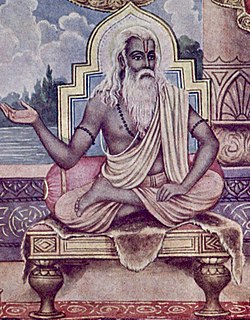A Quote by Ralph Waldo Emerson
Intellect annuls fate. So far as a man thinks he is free.
Related Quotes
Someone should keep reminding Mr. Average Man that he was born free, divine, strong; uncrushable by fate, society, or hell itself; and that he is a child of God, equal heir to all the bounties of God; and that goodness is riches, kindness is power, and freedom is glory. Above all, every man is born with an inner capacity to take him as far as his imagination can dream or envision-providing he is free to dream and envision.
Is there any man that thinks in chains like the man who calls himself a free-thinker? Is there any man so credulous as the man who will not believe in the Bible? He swallows a ton of difficulties, and yet complains that we have swallowed an ounce of them. He has much more need of faith of a certain sort than we have, for skepticism has far harder problems than faith.
Commemoration of Gilbert of Sempringham, Founder of the Gilbertine Order, 1189 Some there are who presume so far on their wits that they think themselves capable of measuring the whole nature of things by their intellect, in that they esteem all things true which they see, and false which they see not. Accordingly, in order that man's mind might be freed from this presumption, and seek the truth humbly, it was necessary that certain things far surpassing his intellect should be proposed to man by God.
Free will appears unfettered, deliberate; it is boundlessly free, wandering, the spirit. But fate is a necessity; unless we believe that world history is a dream-error, the unspeakable sorrows of mankind fantasies, and that we ourselves are but the toys of our fantasies. Fate is the boundless force of opposition against free will. Free will without fate is just as unthinkable as spirit without reality, good without evil. Only antithesis creates the quality.
The soul must be distinct from intellect because even at its best, what the soul does when it's thinking, is it thinks linguistically, it thinks in a temporarily extended way, so it for example, might go through the steps of an argument chain, as if you were going through a syllogism and seeing that something followed from the premises, whereas intellect simply grasps the forms.
Man is a rational animal—so at least I have been told. … Aristotle, so far as I know, was the first man to proclaim explicitly that man is a rational animal. His reason for this view was … that some people can do sums. … It is in virtue of the intellect that man is a rational animal. The intellect is shown in various ways, but most emphatically by mastery of arithmetic. The Greek system of numerals was very bad, so that the multiplication table was quite difficult, and complicated calculations could only be made by very clever people.
They had rejected the soul-body dichotomy, with its two corollaries: the impotence of man's mind and the damnation of this earth; they had rejected the doctrine of suffering as man's metaphysical fate, they proclaimed man's right to the pursuit of happiness and were determined to establish on earth the conditions required for man's proper existence, by the "unaided" power of their intellect.






































